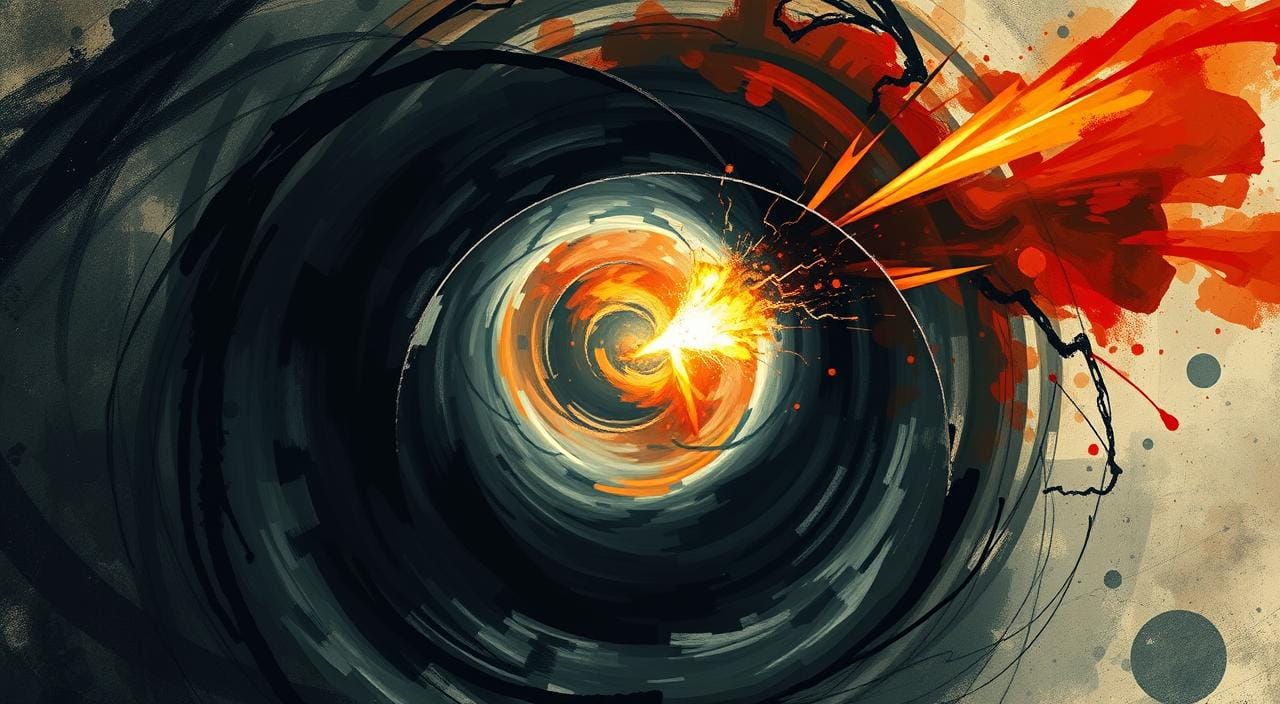Ending things with a narcissist is tough. Cutting ties is especially hard. One powerful step is the “no contact” rule. This means cutting off all communication and focusing on your well-being. The newsletter offers great advice on this journey. Learn what 7 things narcissists do when you go no contact.
But, when a narcissist feels you’re leaving, they might try to pull you back. They use tricks to control and keep you interested. Knowing these tactics helps us stay strong and focused. Let’s look at the 7 main ways narcissists react when you go no contact.
Key Takeaways
- Narcissists may try harder to get your attention and control when you set the no contact rule1.
- They might use guilt to make you feel bad or say you’re wrong when you stick to no contact1.
- Narcissists could get angry and send scary messages or attack you verbally when you enforce no contact1.
- They might try to win you back with guilt or by being overly nice after you’ve gone no contact1.
- If they can’t control you anymore, they’ll look for someone else to feed their emotional needs1.
Understanding the No Contact Rule

Going “no contact” means cutting off all communication with someone after a breakup or divorce2. This includes avoiding meetups, calls, messages, emails, social media, and stalking. The no contact rule helps end toxic relationships by removing the narcissist’s control2.
What Does It Mean to Go “No Contact” With Someone?
The no contact rule means not facing the narcissist, blocking phone numbers and social media, and changing passwords2. It’s key to protect yourself from their manipulative tactics and regain control3.
The Challenges of Going No Contact with a Narcissist
Going no contact with a narcissist is hard because they feel superior and entitled3. They might use threats, lies, or guilt to get you back3. Narcissists could react by idealizing you again, making you feel guilty, or ignoring you2.
Psychological issues like trauma bonding and fear of abandonment can arise2. It’s important to stick to the no contact rule forever, not just for revenge2. You need resilience, self-awareness, and support to overcome their tactics and heal3.
“The no contact rule is an effective strategy for ending toxic relationships as it takes away the narcissist’s opportunity to control and manipulate you.”
| Key Challenges of Going No Contact with a Narcissist | Strategies to Maintain No Contact |
|---|---|
|
|
Going no contact and healing from narcissistic abuse is a big step towards reclaiming your life3. With the right strategies and support, you can break free and start a journey of self-discovery32.
7 things narcissists do when you go no contact
Going no contact with a narcissist can be tough. They might try to control you again and keep you involved1.
Survivors often feel powerless and hopeless. This is because of the abuse they suffered4. Narcissists get jealous and insecure when you focus on yourself, seeing it as a rejection4.
- Intensified Attempts to Regain Control: Narcissists fear losing control and their power over you4. They try harder to keep you in their grasp.
- Playing the Victim to Gain Sympathy: They pretend to be victims to get your pity and make you come back5.
- Spreading Misinformation and Lies: Narcissists distort facts to discredit you and regain control5.
- Manipulative Guilt-Tripping: They use guilt to make you feel responsible for their feelings and want you back5.
- Displaying Anger and Aggression: When they lose control, narcissists get angry and belittle you5.
- Attempting to Reengage Through Hoovering: They try to win you back to avoid being ignored5. They might end the relationship to get revenge5.
- Moving On to New Sources of Supply: Narcissists find new people to satisfy their needs and attention5.
Dealing with a narcissist after no contact needs strong will and support1. Knowing their tactics helps survivors prepare and protect themselves1.

Healing from a narcissist is hard, but possible with the right help1. You can overcome the emotional pain and take back your life1.
Intensified Attempts to Regain Control
When a narcissist finds out you’re serious about going no contact, they try harder to keep control6. They might send lots of messages, call you nonstop, and even show up at your home or work6. Their main goal is to get your attention and approval back, as they feel left out without you6.
Love Bombing and Aggressive Threats
Narcissists try to win you back by being overly nice and then suddenly threatening6. They start by being charming and caring, then turn aggressive and try to cut you off from friends and family6. Their mood swings come from their own insecurity and need for constant validation7.

It’s crucial to stay strong and not give in to their tactics7. Knowing how narcissists act helps us deal with them better and focus on our own safety7.
Playing the Victim to Gain Sympathy
When we cut off a narcissist’s supply, they might play the victim to get our sympathy and attention8. They dislike being ignored and may act out to get noticed8. They pretend to be mistreated to make us feel sorry for them and obligated8.
Narcissists often react badly to being ignored, even violently8. They see it as a game to get our attention back8.
Narcissists use emotional abuse like guilt-tripping and playing the victim to keep us in contact1. They spread lies to make themselves seem like victims and get sympathy8. They tell sad stories to get us to feel sorry for them8.
This trickery makes us doubt our own sanity and what’s real9. We might wonder if we’re the narcissist9. But, we must focus on our safety and peace, not false claims9.

Knowing how they manipulate is key to escaping their abuse and taking back our lives81. By being alert and setting clear boundaries, we can stop them from controlling us1.
Spreading Misinformation and Lies
Narcissists often distort facts and spread confusion as a form of emotional abuse. Breakups may involve spreading false information about an ex, making it feel like a10. They might make up reasons for the breakup instead of being honest. This is often to control who stays in touch and avoid blame10.
Distorting Facts and Creating Confusion
The narcissist aims to undermine your credibility and make you uncertain. They might tell lies, spread rumors, or involve others in your relationship. Narcissists may become very active socially to get more attention after being rejected or when there’s “no contact”11.
This behavior is often to control the story, keep their image intact, and avoid blame. “Narcissists’ 7 Reactions to No Contact: What to Expect” shows how they try to control the narrative and avoid truth10.
Feeling frustrated and angry because they can’t control how others see them is common for narcissists10. Trying to manage their reputation to counter lies might not change people’s minds10. The best response to their deceitful behavior is to move on and live well10.

“Due to rampant misinformation on cluster b disorders, the conflation of NPD and BPD is one of the most misunderstood things in this context.”12
Narcissists may show cognitive dissonance when rejected and might get more aggressive. They might even involve friends, family, or neighbors against the person they rejected11. Social media is key for narcissists, who crave “likes” and positive comments11.
It’s important to understand how narcissists spread misinformation and distort facts after a breakup. By staying true to yourself and focusing on healing, you can overcome the confusion and take back control of your story101112.,,
Manipulative Guilt-Tripping
When you decide to go no contact with a narcissist, they might use guilt-tripping13. Narcissists often use guilt to control others13. They might say they’re suffering or blame you to make you feel guilty13.
Narcissists use emotional blackmail to make you feel guilty or scared13. They might say you’re leaving them or that your decision will hurt them a lot.14 Knowing how they use your weaknesses against you helps you fight back13.
It’s important to set boundaries against emotional blackmail and guilt13. Healthy relationships are based on respect and love, not control13. Taking care of your mental health is key to resist their control13.
Being strong means standing up to manipulation and not letting guilt control you13. By setting clear boundaries, you can escape their toxic influence and take back your freedom. Learn more about narcissists’ reactions to no contact.

“Narcissists often use excessive guilt-tripping as a tool to control and center relationships around themselves. Prioritizing mental health and well-being is crucial to combat manipulation and regain autonomy.”
Displaying Anger and Aggression
When you decide to go ‘no contact’ with a narcissist, their ego might get hurt. Narcissistic rage is intense anger when their self-image is threatened15. People with NPD often show aggression because they don’t get the admiration they want15.
Threats, Verbal Attacks, and Belittling
The narcissist’s anger might show up as threats, verbal attacks, and public criticism15. These actions aim to scare and make you want to please them again15. Their rage can lead to relationship problems or financial issues15.
Things like early trauma, a sensitive nature, and fear of being exposed can cause narcissistic rage15. Unlike normal anger, it bursts out when their superiority is challenged15.
These tactics, like threats, verbal attacks, and belittling, are how they try to control you again16. It’s important to know these behaviors to protect yourself16.
“Narcissistic rage is a state of intense anger, aggression, and shame that results from a narcissist’s core perceived ‘imperfection’ being threatened, challenged, or exposed.”
Dealing with narcissistic rage can be tough, often needing mental health help15. Knowing why and how they act can help us deal with their anger better1516.
Attempting to Reengage Through Hoovering
When you cut ties with a narcissist, they might try to pull you back in. This is called “hoovering.” It’s a way for them to get back in control and feed their need for attention17.
Narcissists are good at making you feel like you can’t leave them. They use mixed signals to keep you hooked17. They might shower you with love, flatter you, or make you feel guilty to get your attention18.
Covert narcissists might start small to see if you’re interested. They think any response means you’re ready to give them what they want17. They believe they can control you through their tricks17.
It’s important to remember that talking to a narcissist again can make them think you’re okay with their abuse. This can make them think they can start over17. You should only talk to them if it makes you feel better, not to please them17.
It’s key to keep your distance and stick to your decision to cut ties. This stops the narcissist from getting back in control and keeps you safe18. By not engaging, you protect yourself and move away from their harmful influence18.
Getting out of a narcissistic relationship and staying away can be tough. But it’s a crucial step towards healing and taking back your life. Knowing their tricks and staying firm in your choice helps you break free and start anew18.
Moving On to New Sources of Supply
When narcissists can’t control you anymore, they look for new people to admire and validate them19. These new people become important to them, helping to boost their self-worth19.
Finding New Targets for Admiration and Validation
Narcissists always want more admiration and attention19. They might find a new partner or turn to friends, family, and even strangers for this19. Their goal is to keep getting attention to feel good about themselves19.
| Type of Narcissistic Supply | Description |
|---|---|
| Primary Narcissistic Supply (PNS) | Intimate partners and relationships that hold the most emotional charge for the narcissist19. |
| Secondary Narcissistic Supply (SNS) | Constant individuals like family, friends, and colleagues who serve as backup supply when primary sources are unavailable19. |
| Narcissistic Tertiary Supply (NTS) | Lower-level individuals, often strangers, used for quick boosts of attention and adoration by the narcissist19. |
Narcissists often focus on their primary sources at first19. They use secondary sources when needed and tertiary sources for quick fixes19. Their constant search for admiration drives them to find new sources19.
“Attention, whether positive or negative, is crucial for the narcissist to regulate their self-worth.”19
As they find new sources, narcissists often ignore or discard the old ones19. This makes the old source feel unimportant and left behind. This is a common way narcissists abuse others19.
Navigating the Aftermath of No Contact
Stepping away from a narcissistic relationship is a big change. It can feel overwhelming. But, we can move forward by being kind to ourselves and seeking help20.
Leaving a narcissist can make us feel many emotions. We might feel denial, anxiety, obsession, loneliness, and grief21. Yet, by facing the truth and the abuse we’ve suffered, we can get through it and grow stronger21.
Rebuilding Self-Esteem and Resilience
One big challenge is rebuilding our self-esteem. The narcissist’s actions made us doubt ourselves and our skills20. Working with a coach or therapist can help us set better boundaries and find our self-worth again20.
It’s also important to build resilience. The journey ahead will be tough, but we can get through it. By learning coping strategies, taking care of ourselves, and having a supportive network, we can face challenges with more confidence20.
The aftermath of no contact is a journey, not a finish line. With time, kindness to ourselves, and professional help, we can come out stronger. We’ll have healthier relationships and a better understanding of our own strength2021.
Conclusion
Going no contact with a narcissist is tough. They use many tricks to control us and make us feel bad. They might shower us with love, then guilt trip us, spread lies, or get very aggressive. These actions aim to break our will and pull us back into their toxic world22.
But, we can fight back by being careful and setting strong boundaries. This helps us keep our emotional health safe and take back our lives23. Healing and boosting our self-esteem is hard, but with friends who support us and our own growth, we can get through it. We’ll come out stronger and more resilient23.
As we keep moving forward, let’s hold onto what we’ve learned. Trust our gut, put our needs first, and know that people can change. This way, our future relationships will be based on respect, empathy, and honesty. We’ll avoid the toxic influence of narcissism24.
FAQ
What does it mean to go “no contact” with someone?
Why is going no contact with a narcissist challenging?
What are some common reactions and tactics narcissists use when you go no contact?
How might a narcissist try to intensify their attempts to regain control?
How might a narcissist play the victim to gain sympathy?
How might a narcissist spread misinformation and lies?
How might a narcissist use manipulative guilt-tripping?
How might a narcissist display anger and aggression?
What is “hoovering,” and how might a narcissist use it?
How might a narcissist move on to new sources of supply?
How can you navigate the aftermath of going no contact with a narcissist?
Source Links
- 7 Things Narcissists Do When You Go No Contact – https://www.linkedin.com/pulse/7-things-narcissists-do-when-you-go-contact-kamini-wood-hbfoe
- Setting Boundaries With Narcissist: No Contact Rule – https://medium.com/psychology-self-healing/setting-boundaries-with-narcissist-no-contact-rule-b1b87e3a904c
- 7 Tactics to Tackle During No Contact With a Narcissist – https://www.marriage.com/advice/mental-health/things-narcissists-do-when-you-go-no-contact/
- How the Narcissist Feels When You Go No Contact | Blog – https://www.flourishinghope.com/how-the-narcissist-feels-when-you-go-no-contact/
- Do Narcissists Come Back After No Contact? – https://www.marriage.com/advice/mental-health/do-narcissists-come-back-after-no-contact/
- 6 Things Narcissists Do When You Go No Contact – https://rebeccazung.medium.com/6-things-narcissists-do-when-you-go-no-contact-a70847cbe57f
- 7 Things Narcissists Do When You Go No Contact (Explained) – https://narcissisthome.com/7-things-narcissists-do-when-you-go-no-contact/
- What Happens When You Ignore a Narcissist? – https://www.marriage.com/advice/mental-health/what-happens-when-you-ignore-a-narcissist/
- He’s Calling ME Crazy But He’s An Abuser! – https://www.btr.org/im-a-victim-of-narcissistic-abuse-but-hes-calling-me-crazy/
- Understanding why an ex is spreading misinformation about you (or building a case against you to break up) – https://www.baggagereclaim.co.uk/understanding-why-an-ex-is-spreading-misinformation-about-you-or-building-a-case-against-you-to-break-up/
- How Does a Narcissist Handle Rejection and No Contact – https://upjourney.com/how-does-a-narcissist-handle-rejection-and-no-contact
- What Narcissists and Borderlines Have in Common and in Opposition – https://medium.com/@SPClusterB/what-narcissists-and-borderlines-have-in-common-and-in-opposition-7653223610d3
- 7 cunning ways narcissists use guilt to put one over you, according to psychology – https://geediting.com/cunning-ways-narcissists-use-guilt-to-put-one-over-you-according-to-psychology/
- The Narcissist’s Arsenal of Manipulative Tactics – ITR – https://www.intherooms.com/home/iloverecovery/all/the-narcissists-arsenal-of-manipulative-tactics/
- What Is Narcissistic Rage? – https://www.verywellmind.com/what-is-narcissistic-rage-5183744
- How to Hurt A Narcissist & Get Revenge – https://www.simplypsychology.org/how-to-hurt-a-narcissist.html
- What narcissists are thinking when you stay in contact after the discard – https://sylvialongmire.medium.com/what-narcissists-are-thinking-when-you-stay-in-contact-after-the-discard-4fda3b6666fb
- 10 Things Narcissists Do When You Go No Contact – https://grace-being.com/love-relationships/things-narcissists-do-when-you-go-no-contact/
- WARNING You Do Not Want to Become a Narcissist’s Source of Supply…. Believe Me! – Narcissistic Behavior – https://narcissisticbehavior.net/narcissists-source-of-supply/
- What to expect after leaving your narcissist and going “no contact” – https://psychcentral.com/pro/recovery-expert/2018/01/what-to-expect-after-leaving-your-narcissist-and-going-no-contact
- The Emotional Hell of Going No Contact with a Narcissist – Fairy Tale Shadows – https://fairytaleshadows.com/emotional-hell-going-no-contact-with-a-narcissist/
- Do Narcissists Return After Several months of the Silent Treatment? – https://toxicrelationships.medium.com/do-narcissists-return-after-several-months-of-the-silent-treatment-7fad6fe5bbd1
- Should you go “No Contact” with the narcissist in your life? – https://youronlinecounselor.com/phpbb/viewtopic.php?t=68
- 7 Things Narcissists Say to Excuse Their Behavior and Keep You Under Control – https://ringgoldpediatric.com/__-9ghqx6sfug/







